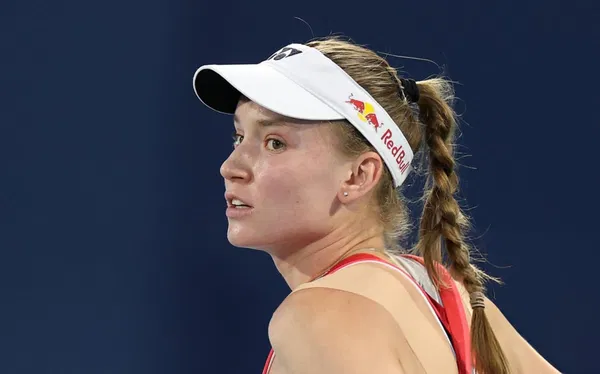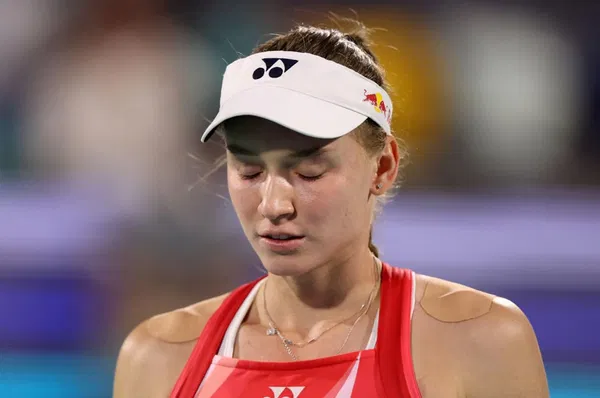
Elena Rybakina was once considered part of the “Big Three” in women’s tennis alongside Iga Swiatek and Aryna Sabalenka. However, she has recently been in the spotlight more for off-court drama than her performances on the court. The World No. 7’s run at the Australian Open ended in the fourth round, where she was defeated by eventual champion Madison Keys. While this was a setback, the real turmoil was happening behind the scenes—her longtime coach, Stefano Vukov, was provisionally banned for allegedly violating the WTA’s code of conduct. On February 11, following an independent investigation, the WTA upheld the ban, adding another layer of controversy to Rybakina’s career. Although she has voiced her disagreement with the decision, the tennis world has been divided on the matter.
Coaching Changes and a Controversial Ban
Rybakina and Vukov ended their five-year partnership in August 2024 for undisclosed reasons. During their time together, she won Wimbledon in 2022 and reached a career-high ranking of No. 3. Seeking a fresh start, she hired Novak Djokovic’s former coach, Goran Ivanisevic, in November 2024. Initially, this seemed like a promising new chapter for her career. However, in January, she unexpectedly announced that Vukov was returning to her team. Since he was still under investigation, he was denied accreditation for the Australian Open, leaving Rybakina to rely on Ivanisevic during the tournament. After her run in Melbourne ended, Ivanisevic decided to end their trial partnership, reportedly due to Vukov’s return.

On February 11, the WTA confirmed that Vukov’s suspension would remain in place, though they did not disclose the length of the ban or the exact rule he violated. Reports suggested that Vukov had been accused of verbally abusing Rybakina.
Support and Criticism from Fellow Players
While Rybakina has remained loyal to her coach, some of the sport’s top competitors have expressed support for the WTA’s decision.
World No. 2 Iga Swiatek stated that the ruling should be respected. “I guess everybody needs to respect the decision because we need to trust that the whole process was made with the right rules,” she said at the Dubai Championships on February 16. “Every personal trainer, every coach, they need to accept the code of conduct when they want to be on the WTA. So for sure, I hope the WTA is doing everything to make it a safe environment.”
American No. 3 Coco Gauff also backed the WTA’s stance, emphasizing the importance of player protection. “From my understanding, I know she doesn’t like the decision. I know WTA also has the right to protect her. Overall, it’s nice that the WTA is making sure that they’re out there to protect players,” Gauff said. She also highlighted how power dynamics in the sport can sometimes leave players unaware of their own mistreatment. “I definitely think that that’s important in our sport because a lot of times if you look, sometimes victims don’t even know they are a victim. In this sport, it’s happened so many times. A lot of times you see former players speaking out years after their career ended about how they were treated.”
World No. 5 Jessica Pegula, a WTA Player Council member, also weighed in on the issue. She pointed out that women’s tennis can create isolating environments for young players, making them vulnerable to unhealthy dynamics. “Tennis is just not a healthy sport for women as far as, like, you’re very secluded from a young age. You’re mentally traveling every week. You’re with a lot of different people. A lot of times your family can’t come with you. When you start doing that at ages 13, 14, and 15, it can go sideways fast. We’ve learned that from a lot of the cases back in the day,” she said.
Rybakina Stands by Vukov
Despite the controversy, Rybakina has remained firm in her support for Vukov. “I’m just disappointed with the situation and how the process went,” she said following the WTA’s ruling. She had already defended him back in January when the provisional ban was first issued. “I can only say, and I’ve said it already before, that he never mistreated me, or it was never anything like that,” she told Brisbane Times on January 4.
She also pushed back against the backlash directed at Vukov, particularly from within the tennis community. “I’m not happy with the comments which I see, especially from the people on the tour. It’s active coaches and commentators. I don’t think it’s fair,” she said.
What’s Next for Rybakina?
With Vukov banned, Rybakina made another coaching change, hiring David Sanguinetti in February before the Abu Dhabi Open. She entered the tournament as the defending champion but was eliminated in the semifinals by Belinda Bencic. At the Qatar Open, she suffered another early exit, losing in the quarterfinals to Swiatek in straight sets, 6-2, 7-5.
Next up is the Dubai Tennis Championships, where she will face either Jelena Ostapenko or Moyuka Uchijima in her opening match. With the coaching drama still unfolding, the question remains: Can she find her rhythm and return to her best form?